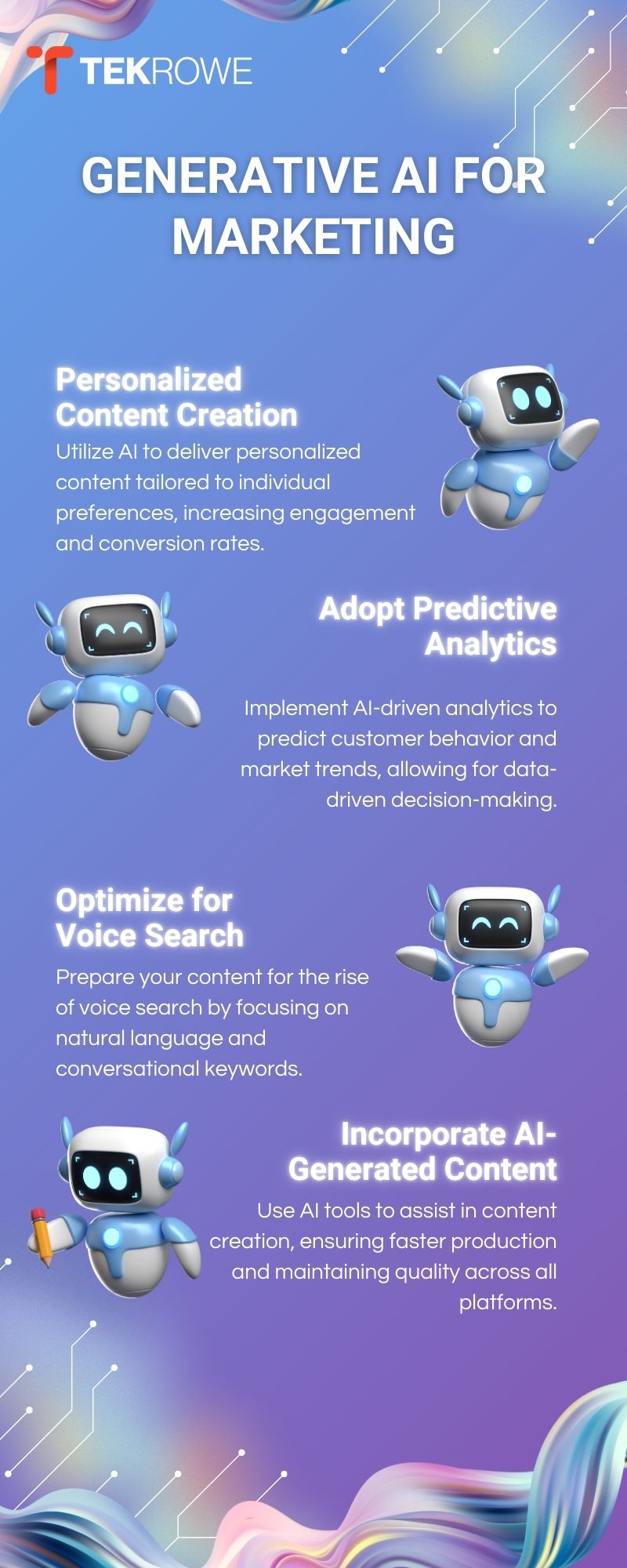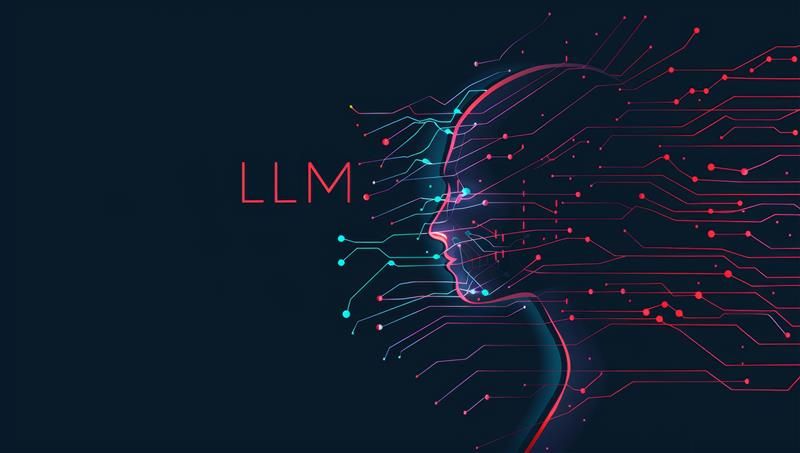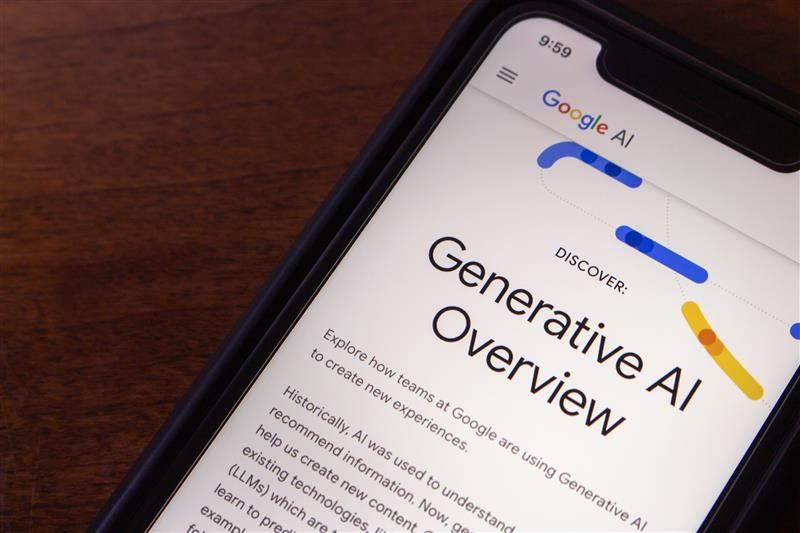Generative AI is reshaping how businesses approach marketing, content creation, and customer engagement. With the ability to create human-like text, graphics, and even videos, this technology has become a powerful tool for marketers worldwide. According to a recent study, 70% of businesses believe AI has significantly improved their content marketing strategies. In 2023 alone, the AI marketing industry was valued at over $15 billion. These numbers tell a clear story: generative AI is not just a trend; it's a game-changer.
Beyond numbers, the practical benefits are clear. Businesses are leveraging generative AI to automate tedious content creation tasks, improve targeting strategies, and boost engagement across multiple platforms. In a world where content is king, AI is the tireless servant ensuring the kingdom thrives.
What is Generative AI for Marketing?
Generative AI refers to artificial intelligence systems capable of generating new content based on the data they've been trained on. Whether it's text, images, or videos, generative AI tools can craft marketing materials in seconds, helping businesses scale their content production like never before. Unlike traditional AI, which relies heavily on structured data and specific rules, generative AI learns patterns, context, and intent. This enables marketers to create dynamic, high-quality content tailored to audience preferences.
Generative AI can mimic human creativity, allowing brands to develop campaigns that resonate deeply with their target audience. The technology’s ability to process and understand complex data ensures that the generated content aligns with brand messaging and marketing objectives. This synergy between AI and creativity is reshaping the marketing landscape, enabling scalable and efficient campaigns.
How Generative AI Differs from Traditional AI
While traditional AI focuses on analyzing and processing data, generative AI takes things further by creating entirely new content. Tools like ChatGPT generate blog posts, while platforms like MidJourney produce visuals. This ability to understand and mimic creative nuances makes generative AI a transformative force in marketing. Marketers can now generate customized materials faster and with greater precision.
Traditional AI relies on predefined rules and structured datasets, whereas generative AI uses neural networks and pattern recognition to craft content. This difference allows generative AI to produce contextually relevant outputs, whether it’s a text article or a promotional video. As a result, marketing teams can address diverse audience needs more effectively.
Core Components of Generative AI
Generative AI operates through machine learning models, such as GPT (Generative Pre-trained Transformer) for text and DALL-E for visual content. These models learn from vast datasets and generate output based on patterns, context, and user prompts. They can understand language subtleties, interpret emotions, and create content that aligns with brand messaging. This technological foundation ensures content accuracy and relevance.
The power of these models lies in their training process, where they analyze large amounts of data to predict and generate content. By leveraging this capability, marketers can automate creative tasks while maintaining a human-like touch in their communications. This approach enhances efficiency and consistency across campaigns.
Why Generative AI is Important in Marketing
Generative AI brings scalability, personalization, and efficiency to marketing efforts. It allows brands to communicate with their audience on a deeper level while saving both time and resources. For smaller teams, AI offers an opportunity to compete with larger corporations by automating content production and reducing overhead costs. This creates a level playing field for businesses of all sizes.
Moreover, generative AI enables marketers to experiment with creative ideas without incurring significant costs. By rapidly generating diverse content variations, teams can identify what resonates best with their target audience. This data-driven approach helps maximize ROI and refine future campaigns.
The Evolution of Generative AI in Marketing
Generative AI has evolved significantly over the years. From basic chatbots to highly intelligent AI systems capable of generating video content and complex written material, the transformation has been astounding. Today, AI tools are capable of real-time adjustments, predicting user behavior, and analyzing sentiment. This evolution has made AI more reliable, accurate, and user-friendly, enabling marketers to trust AI-driven campaigns.
Over time, AI algorithms have become more refined, allowing them to produce highly contextual and emotionally engaging content. As generative AI continues to evolve, its applications in marketing will only grow, driving innovation and improving customer connections. The possibilities are limitless.
The Role of Generative AI in Modern Marketing
Generative AI isn’t just about producing content, it’s about producing the right content. From personalizing user experiences to crafting engaging social media posts, AI ensures your brand voice remains consistent across all platforms. Marketers can rely on AI tools to tailor messaging for different audience segments.
With the ability to analyze vast amounts of data, generative AI identifies trends and audience preferences effectively. This enables brands to deploy highly targeted campaigns, ensuring every interaction is meaningful and impactful. The result is improved engagement and customer loyalty.

Predictive Content Creation
Predictive content creation leverages generative AI to anticipate what type of content will resonate most with audiences before it’s even created. By analyzing historical data, trends, and engagement metrics, AI tools predict topics, formats, and styles that are likely to succeed. This allows marketers to stay ahead of audience preferences.
Moreover, predictive AI enables content planning with greater accuracy. Marketers can reduce wasted efforts on low-performing content and focus on producing material that aligns with data-backed predictions. This approach ensures campaigns are consistently engaging and strategically aligned with business objectives.
Trending Applications of Generative AI in Marketing
Hyper-Personalization at Scale
Generative AI enables marketers to deliver personalized messages to thousands of customers simultaneously. By analyzing user data, AI can create tailored emails, social media ads, and even website content. This level of personalization leads to increased customer loyalty and conversion rates.
Additionally, hyper-personalization ensures that marketing materials are always relevant to the user. Brands can refine their outreach strategies based on real-time insights, creating stronger connections with their audience and driving better engagement rates.
AI-Generated Video Content
Generative AI is advancing to include tools that can craft video scripts, voiceovers, and even visual scenes tailored to marketing goals. This helps brands create engaging video campaigns quickly and efficiently.
AI video generation tools can adjust video themes and tones based on audience segments. This ensures content remains highly relevant while being produced at scale, making video marketing more accessible to businesses of all sizes.
Data-Driven Marketing Strategies
AI excels in analyzing large datasets to predict market trends, customer preferences, and purchase behaviors. Marketers can use these insights to create well-informed strategies that drive results.
The ability to process complex data also allows generative AI to identify emerging opportunities. This enables brands to stay ahead of competitors by anticipating market shifts and adjusting their strategies proactively.
Optimizing Customer Feedback Loops
Generative AI analyzes customer reviews and feedback to identify patterns, improving product development and customer satisfaction. This ensures that brands remain responsive to their customers' needs. By identifying recurring concerns and preferences, AI helps brands refine their offerings. This creates a positive cycle of continuous improvement, enhancing brand reputation and loyalty.
Additionally, AI can predict potential issues before they escalate, allowing brands to address customer concerns proactively. Real-time analysis of feedback enables marketers to fine-tune messaging, product features, and customer support strategies. This responsiveness fosters trust and long-term relationships, turning satisfied customers into loyal advocates for the brand.
Voice Commerce and AI-Powered Shopping Experiences
Generative AI is transforming voice commerce, allowing consumers to interact with brands using voice commands through AI-powered assistants like Alexa and Google Assistant. AI can craft tailored voice responses, recommend products, and assist with purchases, creating a seamless shopping experience. This hands-free interaction offers unmatched convenience, especially in mobile-first environments.
Voice-enabled AI systems analyze customer preferences and purchase history to offer hyper-personalized product suggestions. Brands can also use voice commerce insights to improve their product offerings and optimize voice search content, enhancing visibility in AI-driven shopping platforms.
Benefits of Generative AI for Businesses
Enhanced Creativity and Innovation
Generative AI empowers marketers to break free from creative constraints by offering endless content ideas and innovative campaign concepts. Whether it’s designing eye-catching visuals, crafting compelling stories or generating unique ad copy, AI tools ensure campaigns remain fresh and engaging. This creativity boost allows brands to stand out in a crowded market.
Furthermore, AI tools enable rapid experimentation with different creative approaches, reducing the time spent on trial and error. Marketers can test multiple campaign variations simultaneously and quickly identify the most effective direction. This agility fosters a culture of innovation without requiring excessive resource investment.
Reduced Marketing Costs
Generative AI streamlines marketing processes by automating repetitive tasks such as content creation, product descriptions, and customer support scripts. This automation reduces the need for large creative teams and minimizes overhead expenses, allowing businesses to operate more cost-effectively.
Additionally, AI tools ensure marketers can focus their budgets on strategies and campaigns that deliver the highest return on investment. By leveraging data-driven insights, teams can allocate resources more strategically, ensuring every marketing dollar contributes to measurable and impactful results.
Real-Time Analytics and Adjustments
Generative AI empowers marketers with real-time data analysis, enabling quick adjustments to ongoing campaigns. By analyzing user behavior, click-through rates, and engagement metrics, AI tools suggest changes to improve performance instantly. This immediate feedback loop allows campaigns to stay agile and relevant, minimizing resource wastage. Marketers can optimize ad placements, refine targeting, and adjust content in response to live data trends.
Furthermore, real-time analytics foster better decision-making by eliminating guesswork. Marketers can test multiple variations of content, headlines, or visuals and rely on AI-driven insights to identify what resonates best with their audience. This continuous optimization cycle ensures maximum return on investment (ROI) and reduces the risks associated with trial-and-error marketing approaches.
Real-World Use Cases of Generative AI in Marketing
Content Generation for Blogs and Social Media
Generative AI tools excel at producing high-quality content tailored for blogs and social media platforms. These tools create engaging blog posts, social media captions, and ad copies optimized for search engines and audience engagement. AI ensures content aligns with brand voice while maintaining consistency across different channels. This not only saves time but also enhances the scalability of content production.
Additionally, AI tools analyze trending topics, keywords, and user preferences to craft content that captures attention. With the ability to generate multiple drafts in seconds, marketers can experiment with different tones and formats to identify the most effective approach. This automated content generation frees up human resources for strategic tasks, driving overall efficiency.
Chatbot-Driven Customer Support
AI-powered chatbots have transformed customer support by providing instant, human-like responses to queries. These chatbots operate 24/7, ensuring customers receive assistance at any time without delays. They handle common questions, resolve issues, and guide users through purchase processes, improving customer satisfaction and reducing response times.
In addition to basic support, AI chatbots can analyze customer interactions to detect patterns and preferences. This data can be used to personalize future engagements and offer proactive assistance. By integrating AI chatbots into customer service workflows, brands can enhance user experiences while reducing operational costs.
Visual Content Creation
Generative AI tools like DALL-E and MidJourney are revolutionizing visual content creation. These tools can generate high-quality, brand-aligned visuals for advertisements, social media posts, and marketing campaigns. Whether it’s product mockups, infographics, or promotional images, AI can produce stunning graphics in seconds.
Moreover, AI ensures consistency in visual elements, maintaining brand aesthetics across different marketing materials. Businesses no longer need to rely entirely on graphic designers for every visual asset, allowing them to scale content production without compromising quality. This capability empowers marketers to deliver visually appealing campaigns efficiently.
Product Descriptions and Copywriting
Generative AI simplifies the process of writing product descriptions and marketing copy. By leveraging AI tools, marketers can generate SEO-friendly descriptions tailored to different platforms, enhancing product visibility in search results. These tools ensure consistency in tone, style, and messaging across multiple product listings.
AI-powered copywriting also allows businesses to experiment with various versions of descriptions to identify the most effective language. With quick turnaround times, marketers can optimize product pages and sales materials without delays, resulting in improved customer engagement and higher conversion rates.
AI-Powered Email Marketing
Generative AI enhances email marketing by crafting hyper-personalized campaigns based on user data and behavior. It can tailor subject lines, email body content, and calls-to-action to appeal to individual recipients. This personalization increases open rates, click-through rates, and overall campaign effectiveness.
AI tools also analyze email campaign performance, identifying which content resonates most with the audience. Automated A/B testing enables marketers to refine their email strategies in real-time. This data-driven approach ensures that each email campaign is optimized for maximum engagement and ROI.
Immersive Voice and Video Campaigns
Generative AI tools can create entire video campaigns, including scripts, voiceovers, and animations. These tools allow marketers to produce polished video content without requiring extensive technical expertise. From explainer videos to promotional clips, AI accelerates content creation and reduces production costs.
Voice generation tools further enable hyper-personalized voice campaigns, ensuring the messaging aligns with audience preferences. This immersive content approach helps brands establish deeper connections with their audience, making campaigns more impactful and memorable.
Generative AI and Emotional Marketing
Generative AI is advancing to include emotional intelligence, helping marketers craft stories and campaigns that resonate emotionally. AI tools can now identify emotional triggers and incorporate them into marketing materials, creating campaigns that not only inform but also inspire action.
Case Study: AI-Powered Storytelling Campaigns
Successful brands have leveraged AI to create captivating storytelling campaigns that drive engagement. AI tools help analyze audience preferences and craft narratives tailored to specific segments. These campaigns combine compelling visuals, powerful messaging, and emotional triggers to leave a lasting impression.
For example, AI-generated storylines can adapt based on real-time audience feedback. Marketers can monitor reactions and tweak narratives to ensure maximum impact. These case studies highlight the effectiveness of AI in building authentic, audience-focused campaigns.
Need Help with Your Business
Contact Us NowThe Future of Generative AI in Marketing
Interactive AI-Generated Experiences
The future of generative AI in marketing includes interactive experiences like personalized augmented reality campaigns. AI can create immersive scenarios where users interact with products or services in real-time through AR or VR platforms. This technology enhances user engagement and brand recall.
Brands can also use AI to generate virtual experiences, like guided product demos or interactive storytelling. These AI-generated experiences offer unique and memorable brand interactions, setting companies apart from competitors.
Real-Time Sentiment Analysis
Generative AI enables marketers to perform sentiment analysis in real-time, offering instant insights into audience reactions. By analyzing social media comments, reviews, and user interactions, marketers can adjust campaigns to address negative feedback or amplify positive sentiments.
These insights allow brands to stay ahead of potential PR crises and fine-tune their messaging for better engagement. Sentiment analysis ensures campaigns remain relevant and emotionally aligned with audience expectations.
Ethical Considerations
As generative AI becomes more integrated into marketing strategies, ethical concerns are gaining prominence. Ensuring that AI-generated content remains unbiased, transparent, and respectful is essential for maintaining brand integrity. Companies must establish guidelines to prevent AI from producing misleading or harmful content.
Additionally, ethical AI use requires transparency about AI involvement in content creation. Audiences should be informed when they are interacting with AI-generated content, fostering trust and accountability. Striking a balance between automation and ethical responsibility is crucial for long-term success in AI-driven marketing.
How to Get Started with Generative AI in Your Marketing Strategy
The first step in integrating generative AI into your marketing strategy is to clearly define your goals. Whether it’s improving content creation, personalizing campaigns, or analyzing customer sentiment, identifying objectives helps select the right AI tools. Starting with smaller AI-driven projects allows teams to build familiarity and confidence in using these technologies.
Training your marketing team on AI tools is equally important. Ensuring they understand the capabilities and limitations of AI fosters better collaboration between human creativity and machine intelligence. Continuous analysis and optimization are key to refining AI-driven strategies over time.
Common Challenges with Generative AI in Marketing
Despite its benefits, generative AI in marketing faces several challenges. Data privacy concerns remain one of the biggest issues, as AI tools require access to vast amounts of user data to function effectively. Companies must comply with data protection regulations to avoid breaches and maintain customer trust.
Another challenge is over-reliance on automation, which can dilute a brand's unique voice and personality. Additionally, integrating AI tools with existing marketing systems can be complex and time-consuming. Addressing these challenges is essential for successful AI adoption in marketing workflows.
Solutions to Overcome These Challenge
To address data privacy concerns, businesses must implement transparent data usage policies and ensure compliance with data protection laws. Educating teams on best practices for secure data handling helps minimize risks. Regular audits can also identify potential vulnerabilities and ensure adherence to privacy standards.
Human oversight remains crucial in maintaining brand voice consistency. Marketers should actively review AI-generated content to ensure alignment with the brand’s identity. By combining AI automation with human creativity and supervision, companies can leverage AI’s strengths while minimizing its limitations.
Key Tools for Generative AI in Marketing
A variety of AI tools are available to enhance different aspects of marketing. OpenAI's ChatGPT is ideal for content creation, generating blog posts, ad copy, and chatbot scripts. MidJourney and DALL-E excel in creating visually stunning graphics and artwork tailored to brand guidelines.
For email campaigns, tools like Jasper AI and Copy.ai offer robust personalization and optimization features. Video creation platforms like Synthesia enable marketers to produce AI-driven video campaigns efficiently. Leveraging these tools strategically can significantly enhance marketing outcomes.
Conclusion
Generative AI is a revolutionary force in marketing. Whether automating content creation, improving engagement, or analyzing data, AI is transforming how businesses connect with their audiences. From scalable content creation to hyper-personalized experiences, the technology is redefining the boundaries of marketing strategies. The future of marketing is here, and it’s powered by generative AI. Are you ready to embrace it? Those who adapt quickly will not only thrive but also set new industry standards. The potential of generative AI is limitless, and its impact will continue to reshape the marketing landscape for years to come.




